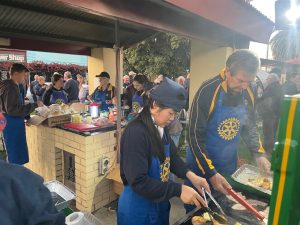Refugee community joins Anzac Day service
Local Karen refugees have joined in and helped the community in the town of Nhill, in Victoria’s Mallee district, commemorate Anzac Day.
About 30 members of the Karen community turned out to attend the traditional dawn service.
And other members helped with preparations for the town’s annual service and also manned the breakfast stalls alongside members of the local Rotary Club.
L ocal community leader John Millington said the day was well supported.
ocal community leader John Millington said the day was well supported.
“We had about 200 people attend the dawn service and about 500 at the later events,” Mr Millington said.
“It was wonderful to see the all of our community, including the Karen, well represented. When we began the service and breakfast twenty years ago we had about eight or ten people come along,” he said.
“This year was different which makes the whole thing worthwhile,” Mr Millington said.
Local Karen community leader Kaw Doh said his community was pleased to be able to support the ANZAC Day event,” Kaw Doh said.
“It’s important to remember the people who made sacrifices to preserve out freedom. We, as Karen who have been persecuted and driven form our homes, know well how important freedom and democracy are.
“So we are pleased to be able to support the ANZAC Day commemorations. And it’s important that our children learn about this – it’s important for them as Australians and because of their Karen heritage,” he said.
The Karen first arrived in Nhill in 2009 to take jobs at the local poultry producer Luv a Duck.
Since then around 250 Karen have settled in the town bringing much needed labour to local businesses as well as children, who have kept local schools viable.
The population of Nhill and the wider region had faced a trend of steady decline in numbers over the three decades before the arrival of the Karen.
The Karen took the allies side in WWII and fought alongside the British against the Japanese in what was then Burma.
With the arrival of British colonists in Burma in late 1800s, the Karen people hoped to escape oppressive rule under the Burmese.
Tensions between the two groups reached a high point during World War II when the Karen sided with the British allies and the Burmese fought with the Japanese.
Burma achieved independence from the British in 1948, but the Karen people were not granted rights to their own land, and the Burmese once again became the dominant ethnic group.
During the 1960s, the Burmese army began a campaign against the Karen called “Four Cuts.” Entire Karen communities were forced to relocate to remote jungle communities.
The persecution of the Karen continues today, especially since the military seized power in 2021.
The Karen conflict is the world’s longest-running insurgency. It has been characterised killings, torture and the rape of civilians by Myanmar’s military.
Aid agencies say some 400,000 Karen have been driven from their homes while more than 120,000 refugees, most of them Karen, are sheltered in camps along the Thai-Myanmar border. More than 12,000 now live in the Australia.












